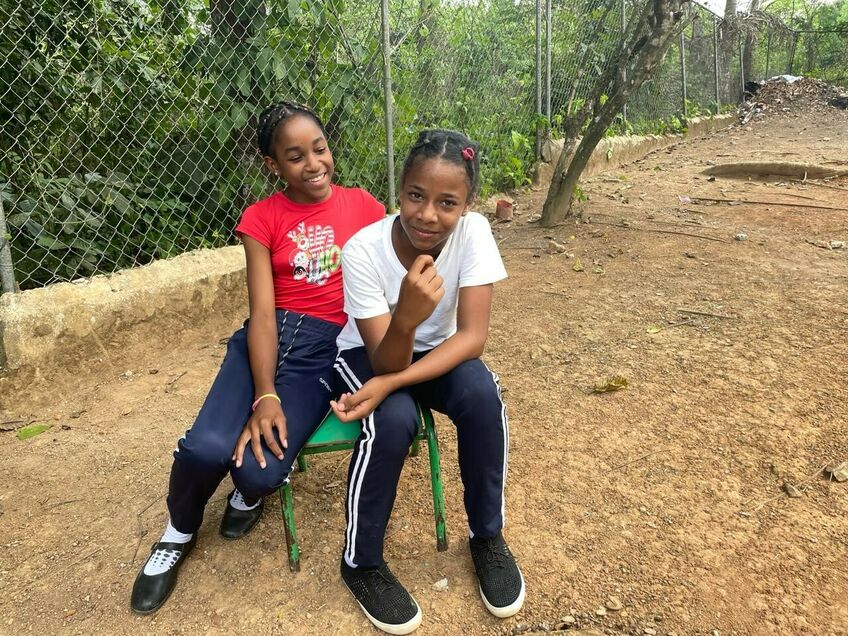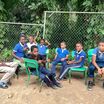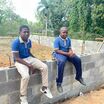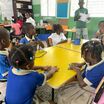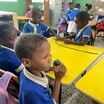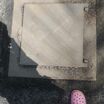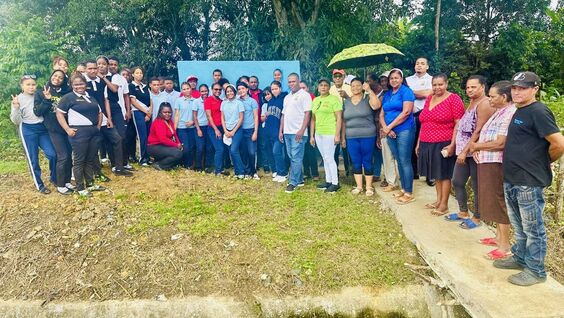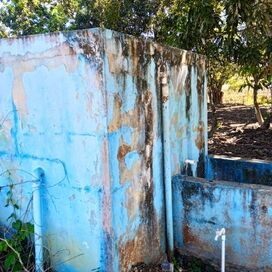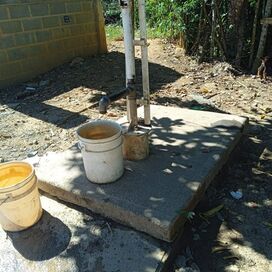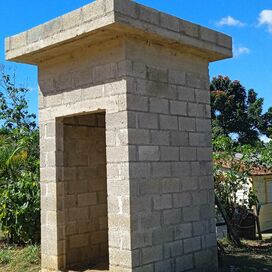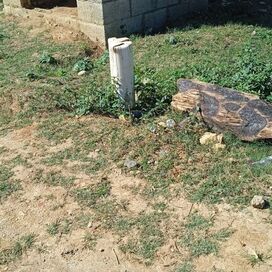Project
WASH for Batey Communities (phase 1)
Project Complete!
The Dominican Republic is home to approximately 230 rural communities known as “bateyes” set up around state-run sugar mills, which once formed the economic backbone of this small Caribbean nation. The bateyes are socioeconomically isolated communities previously built by the government on sugar cane plantations to house cane cutters, mostly from neighboring Haiti. Today, both Haitians and their offspring and Dominicans live in the bateyes in extreme poverty with limited access to essential services, including clean drinking water—a fundamental human right.
Estimates of the populations living and working in these bateyes vary, from 200,000 to more than 1 million, and represent between 7% and 12% of the total population of the Dominican Republic. Despite their size and fundamental role in the Dominican economy, however, batey populations suffer excessively from economic isolation, extreme poverty, and water insecurity. An indicator of this greater water insecurity is that rates of childhood-related and waterborne diseases, primarily diarrhea, within the bateyes are considered three times higher than outside the bateyes. Moreover, children born of undocumented Haitian parents in the bateyes are also undocumented. They cannot attend higher levels of schooling, leading to adverse circumstances and failures. The vulnerable population also suffers from many other diseases, including HIV/AIDS and Tuberculosis, hypertension, diabetes, malnutrition, parasitic infections, cancers, etc.
The Monte Plata province is the fourth poorest province in the country, with 84% of its population living in poverty [of a total population of 180,376 (2002) and a density of 69 people per km2]. Two out of three households risk contamination during water handling due to using dirty or inadequate containers or during transportation and storage at home. The prevalence of diarrhea is 29.1%, with the highest prevalence among children 6 to 11 and 12 to 23 months of age, at 39% and 42%, respectively. These statistics are likely to be even higher within the province's bateyes and explain why batey residents are more affected by water insecurity than those outside bateyes. If left unaddressed, this level of water insecurity could increase the vulnerability of these communities to preventable waterborne diseases and inhibit the academic growth of schoolchildren.
Estimates of the populations living and working in these bateyes vary, from 200,000 to more than 1 million, and represent between 7% and 12% of the total population of the Dominican Republic. Despite their size and fundamental role in the Dominican economy, however, batey populations suffer excessively from economic isolation, extreme poverty, and water insecurity. An indicator of this greater water insecurity is that rates of childhood-related and waterborne diseases, primarily diarrhea, within the bateyes are considered three times higher than outside the bateyes. Moreover, children born of undocumented Haitian parents in the bateyes are also undocumented. They cannot attend higher levels of schooling, leading to adverse circumstances and failures. The vulnerable population also suffers from many other diseases, including HIV/AIDS and Tuberculosis, hypertension, diabetes, malnutrition, parasitic infections, cancers, etc.
The Monte Plata province is the fourth poorest province in the country, with 84% of its population living in poverty [of a total population of 180,376 (2002) and a density of 69 people per km2]. Two out of three households risk contamination during water handling due to using dirty or inadequate containers or during transportation and storage at home. The prevalence of diarrhea is 29.1%, with the highest prevalence among children 6 to 11 and 12 to 23 months of age, at 39% and 42%, respectively. These statistics are likely to be even higher within the province's bateyes and explain why batey residents are more affected by water insecurity than those outside bateyes. If left unaddressed, this level of water insecurity could increase the vulnerability of these communities to preventable waterborne diseases and inhibit the academic growth of schoolchildren.
The lack of access to clean drinking water sources in these communities has often forced families, especially children, to collect water from contaminated rivers or streams for daily consumption. According to parents and schoolteachers, students' tardiness or absences in school are almost always caused by the time they must dedicate to collecting water for the family or by intestinal diseases contracted from consuming contaminated water. Additionally, the schools almost always use contaminated water from water trucks to clean the bathrooms and other areas.
Project Proposal (Phase 1):
Our implementing partner, Batey Relief Alliance (BRA), will dedicate two experienced community health workers and a coordinator to carry out initial surveys in the community to design culturally oriented action plans to create access to clean drinking water to benefit schoolchildren and the community. The rehabilitation of the water systems will be carried out by local construction contractors using the local labor force. Beneficiary families will be encouraged to contribute some time to the projects by assisting with simple and non-expert construction tasks.
Our implementing partner, Batey Relief Alliance (BRA), will dedicate two experienced community health workers and a coordinator to carry out initial surveys in the community to design culturally oriented action plans to create access to clean drinking water to benefit schoolchildren and the community. The rehabilitation of the water systems will be carried out by local construction contractors using the local labor force. Beneficiary families will be encouraged to contribute some time to the projects by assisting with simple and non-expert construction tasks.
BRA will also create a “community organizing task force” comprised of community health workers and a Water Committee in charge of carrying out training and workshops on safely handling water, sanitation, and hygiene (WASH) and maintaining the water systems. Members of the Water Committee will be charged with monitoring the correct use, maintenance, and management of the water systems. All activities will involve the community health workers, schoolteachers, parents, and other interested members of the community.
As an added value to the project's clean water access, all families will receive nutritious food products, vitamin A, multivitamins, and anti-worm medicines from BRA, which are needed to fight water-borne infections and improve their health and well-being.
Schools Included:
Schools Included:
- Primary school Primaria Las Yayas
- Primary school Santa Rosa
- Primary school La Esperanza
- Primary school Los Guineos
Communities Included:
- Las Yayas (80 families)
- Santa Rosa (60 families)
- La Esperanza (68 families)
- Los Guineos (480 families)
Main Water Needs:
- Las Yayas community has an underground water well that needs a new water pump and a water tank.
- The Santa Rosa community has a water system with a damaged pump that needs repairs.
- La Esperanza community has a disabled water system that needs a new water pump and electrical cables.
- Los Guineos community has a water system that needs a submersible pump and maintenance.
H2O for Life is not a WASH (water, sanitation and hygiene) project implementer. We have partnerships with non-governmental organizations (NGOs) implementing WASH in Schools projects around the world. Our NGO partners match funds needed for each school project. We also have a generous donor that provides us with an interest-free loan that, along with matching funds, allows for many projects to be started or possibly even completed before total funds have been raised. In rare situations we reserve the right to reallocate funds to alternate project(s).
Questions? Ask us at 651-756-7577 or info@h2oforlifeschools.org.
Project Sponsors
February 6, 2025
Batey Project a Success
Background:
The Dominican Republic is home to approximately 230 rural communities known as “bateyes” set up around state-run sugar mills, which once formed the economic backbone of this small Caribbean nation....
The Dominican Republic is home to approximately 230 rural communities known as “bateyes” set up around state-run sugar mills, which once formed the economic backbone of this small Caribbean nation....
